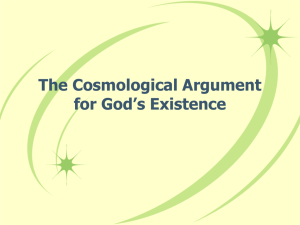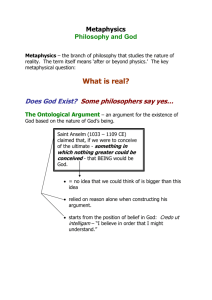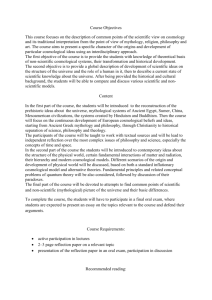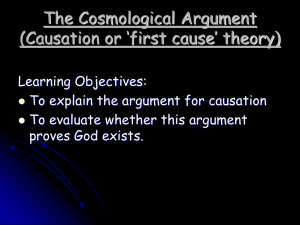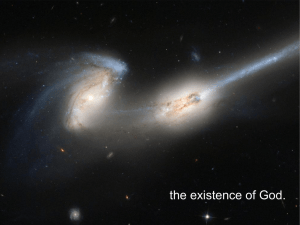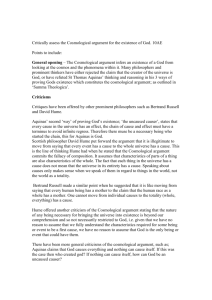The Cosmological Argument for the Existence of God
advertisement
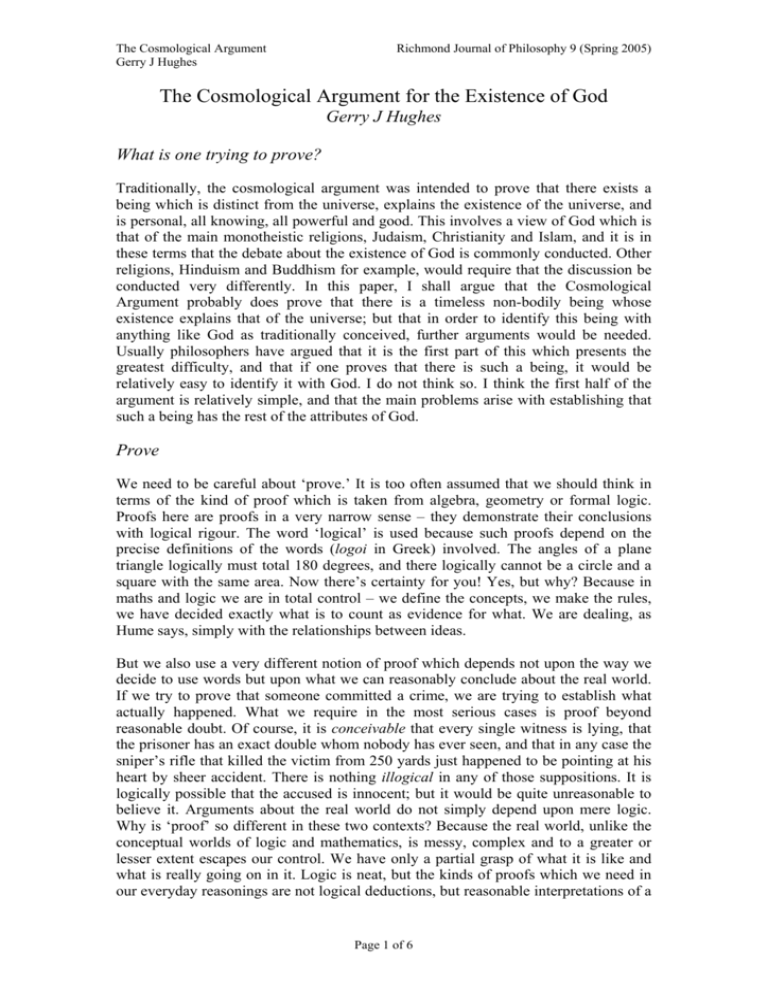
The Cosmological Argument Gerry J Hughes Richmond Journal of Philosophy 9 (Spring 2005) The Cosmological Argument for the Existence of God Gerry J Hughes What is one trying to prove? Traditionally, the cosmological argument was intended to prove that there exists a being which is distinct from the universe, explains the existence of the universe, and is personal, all knowing, all powerful and good. This involves a view of God which is that of the main monotheistic religions, Judaism, Christianity and Islam, and it is in these terms that the debate about the existence of God is commonly conducted. Other religions, Hinduism and Buddhism for example, would require that the discussion be conducted very differently. In this paper, I shall argue that the Cosmological Argument probably does prove that there is a timeless non-bodily being whose existence explains that of the universe; but that in order to identify this being with anything like God as traditionally conceived, further arguments would be needed. Usually philosophers have argued that it is the first part of this which presents the greatest difficulty, and that if one proves that there is such a being, it would be relatively easy to identify it with God. I do not think so. I think the first half of the argument is relatively simple, and that the main problems arise with establishing that such a being has the rest of the attributes of God. Prove We need to be careful about ‘prove.’ It is too often assumed that we should think in terms of the kind of proof which is taken from algebra, geometry or formal logic. Proofs here are proofs in a very narrow sense – they demonstrate their conclusions with logical rigour. The word ‘logical’ is used because such proofs depend on the precise definitions of the words (logoi in Greek) involved. The angles of a plane triangle logically must total 180 degrees, and there logically cannot be a circle and a square with the same area. Now there’s certainty for you! Yes, but why? Because in maths and logic we are in total control – we define the concepts, we make the rules, we have decided exactly what is to count as evidence for what. We are dealing, as Hume says, simply with the relationships between ideas. But we also use a very different notion of proof which depends not upon the way we decide to use words but upon what we can reasonably conclude about the real world. If we try to prove that someone committed a crime, we are trying to establish what actually happened. What we require in the most serious cases is proof beyond reasonable doubt. Of course, it is conceivable that every single witness is lying, that the prisoner has an exact double whom nobody has ever seen, and that in any case the sniper’s rifle that killed the victim from 250 yards just happened to be pointing at his heart by sheer accident. There is nothing illogical in any of those suppositions. It is logically possible that the accused is innocent; but it would be quite unreasonable to believe it. Arguments about the real world do not simply depend upon mere logic. Why is ‘proof’ so different in these two contexts? Because the real world, unlike the conceptual worlds of logic and mathematics, is messy, complex and to a greater or lesser extent escapes our control. We have only a partial grasp of what it is like and what is really going on in it. Logic is neat, but the kinds of proofs which we need in our everyday reasonings are not logical deductions, but reasonable interpretations of a Page 1 of 6 The Cosmological Argument Gerry J Hughes Richmond Journal of Philosophy 9 (Spring 2005) variety of evidence. In less serious court cases we are content to establish guilt or innocence ‘on the balance of probability’ – a weaker test than ‘beyond reasonable doubt.’ This is the standard of proof which we ordinarily use from day to day. Probably John is late because he just missed that train. Still, someone who thinks he might have had an accident otherwise he would surely have phoned might not be being completely unreasonable even if what they think is less likely to be true. For it is very often the case that more than one of a set of incompatible beliefs might be reasonably held. I shall try to prove that God exists, understanding ‘prove’ in the sense of ‘establish on the balance of probabilities.’ I do not think that atheists are being unreasonable, though on balance I believe them to be mistaken. In any event, it is extremely important for both the atheist and the theist to accept that they could – logically could – be mistaken; and that the way each of them reads the evidence might be quite reasonable and yet wrong. Why Hume thinks any such proof is impossible Hume believes that it is impossible to prove that God exists because he does not believe we can prove that any being exists. His argument goes like this: i) The only things one can prove are the relationships between ideas. But such proofs say nothing about whether there exists anything to which these ideas correspond. ii) The only way to know that something exists is not by argument but by experiencing that thing. But all experiences come via the senses, and one cannot sense God. iii) In addition to i) and ii) , Hume believes that any appeal to the notion of causation is bound to fail: We have a habit of projecting the idea of cause onto events. Of course we sense that when one billiard ball hits another, the second one moves; but we do not experience the first ball causing the second ball to move. These arguments are less than conclusive, however. Hume appeals to the narrow, logical, notion of proof. Quite correctly, he claims that a proof of this kind does indeed explore the relationship between concepts (for instance, triangle, angle, sum, etc) but cannot prove that anything exists. But Hume underrates the other sense of ‘prove’, the one which considers the force of evidence in the real world. Think for instance of proving that sub-atomic particles exist, on the basis of evidence and experiments. The theories in atomic physics might all be wrong, in the sense that there is nothing illogical, nothing contradictory in supposing that there are no such particles. But given the evidence we now have it surely quite unreasonable to believe that they do not exist. Of course we cannot sense such particles. So Hume’s second point also seems to be mistaken in maintaining that we cannot come to know that anything exists beyond the reach of our senses. His third point is more complicated. He argues that the regularity with which things in our world behave does not justify us in believing that it is causal necessity which Page 2 of 6 The Cosmological Argument Gerry J Hughes Richmond Journal of Philosophy 9 (Spring 2005) makes them do so. And he is up to a point right: there is no necessary logical connection between regular succession and causation. But once again, he is unwilling to recognise the validity of ordinary standards of reasonableness. Of course it is remotely conceivable that it is pure coincidence that things in the world behave according to regular patterns; it need not be logically impossible that tomorrow pigs might fly, essays might write themselves, and naturally tartan sheep appear overnight grazing quietly in Richmond Park. If such things happened, we could alter our definitions of ‘sheep’ and ‘pig’ and ‘write’ to accommodate such surprising events, just as we have already altered the Greek concept of ‘atom’, which meant ‘unsplittable’, to accommodate the fact that we believe an atom can be split. We can define and re-define our words as we see fit, so that there would then be no logical contradiction in saying that some pigs can fly, and some sheep are naturally tartan. But that’s not the real issue. We want to know what is causally possible in the real world. And here, we surely know beyond reasonable doubt that such endearing things like tartan sheep and flying pigs are pure fantasy, and that it is simply ridiculous to believe that absolutely anything might happen at any time. If the world were so openended, it would be impossible to explain why the world is so regular, and why it is that science has made such progress by assuming that the relationships between things are causal and not just coincidental. Apparently unexpected events must have an explanation even if as yet we do not know what that explanation might be. So Hume does not offer any good grounds for saying that we cannot argue on the basis of causation to the existence of beings which we cannot sense. Scientists do it all the time, and with every justification. Still, such causal arguments, which work well enough in showing that protons or quarks exist, do pose additional problems which have to be overcome if they are to show that it is reasonable to believe that there exists a first cause of the universe, totally beyond the reach of our senses; and further difficulties still in showing that such a first cause bears any resemblance to God. Some of these problems we are just about to see. The Structure of a Cosmological Argument Cosmological arguments vary in detail. But all of them have the same basic structure consisting of four crucial steps. i) Nothing happens without some causal explanation ii) A satisfactory explanation cannot appeal to something which ‘just happened’ and was not caused iii) The existence of the universe requires explanation outside itself iv) It is reasonable to think of this ‘transcendent’ explanation as God. I have already tried to defend i) in my comments on Hume. There is indeed a qualification to be made, however, in that it may be the case that in subatomic physics some events do ‘just happen’. Different radio-active elements decay into other elements at fixed rates, different for each element -- and that predictable regularity might suggest a causal connection. But at least many physicists would argue that even though there is a statistical pattern, the decay of any individual atom might be Page 3 of 6 The Cosmological Argument Gerry J Hughes Richmond Journal of Philosophy 9 (Spring 2005) undetermined, uncaused. This is still a matter of dispute. Einstein thought that events simply could not occur without a cause. So he preferred to say that even in the miniworld of quantum physics individual events must be caused, it’s only that we can’t investigate them; and some contemporary scientists would agree with him. But whatever is the state of affairs in the tiny world of quantum physics, at least middlesized and large events do not just happen. Nor do we think they do. Suppose all the students in the College suddenly fell ill – yet not with flu, nor food poisoning, nor measles nor anything like that. What would we say? ‘Oh, these things happen, and that’s all there is to it’? Or ‘College hit by mysterious illness’? Surely the second. We say ‘mysterious’ because we know that something must have caused the outbreak, even when we cannot as yet find out what it was. Indeed, that is how medicine progresses – precisely by not giving up at this point and saying that some things just happen without any cause at all. Could it have been contact with the tartan sheep, maybe? The second step is somewhat more difficult. You all know the ancient story about what holds the world up. Some sages said that the world rests on the back of a tortoise. And the tortoise? Oh, that is standing on the back of an elephant. So what holds the elephant up? Answers like these, even were they true, would be unsatisfactory precisely because at each stage there is just as much reason to ask the question again as there was at the beginning. In that sense, the explanation has got nowhere. If there was a problem at the beginning with how the earth is supported, there remains just as much of a problem with the elephant. So a satisfactory explanation must end with something about which the same question cannot reasonably be asked. Of course, the list of questions might be as long as you like – but the answer is no better unless there is good reason for stopping the chain of questions. Otherwise the explanation is not complete, and the stopping point merely arbitrary. So the second step of the argument requires that everything should have a complete explanation – on the grounds that an incomplete explanation would leave unanswered exactly the same kind of question that forced us to look for an explanation in the first place. Would it be any better if the chain of explanations was infinitely long, so that one need never get to the start of it? It is often said that Aquinas and other medieval philosophers did not believe that one could have an infinitely long series. This is not accurate. They knew very well that, for instance, the series of whole numbers could be prolonged indefinitely. But it is also clear that they did not believe that there could actually exist an infinite number of things; just as, no matter how long one keeps counting, one has never actually named an infinite number of integers. One has always counted to a particular finite number at any given point. So Aquinas denies that there could ever be an actually infinite number of causal links in a chain. He also held that just carrying on – indefinitely, if you like – repeating the same kind of explanation is in an important sense to get nowhere. All right, you might think, but how does one know when to stop the chain of questions once one has started? The reply is that the chain of explanations will be complete and satisfying only if in the end one reaches something which has not ‘just happened’, simply come into existence; in short, the chain will end when it reaches something which cannot not exist, that is to say, exists necessarily. In short, the explanation will stop when one gets to a Necessary Being. Page 4 of 6 The Cosmological Argument Gerry J Hughes Richmond Journal of Philosophy 9 (Spring 2005) Might it not be, though, that the universe as a whole just happens to be there, even if particular bits of it are caused by other bits? Maybe the Whole Universe is the necessary being we are looking for? There is a promising argument in favour of this conclusion. One of the basic laws of physics is the Law of the Conservation of Energy. As you know, energy can take many forms, of which matter is just one. It is possible to re-arrange the energy in the world in various ways. A tree can be cut down and burned, for instance. The tree has ceased to exist; but the matter/energy of which it was composed have not ceased to exist – it has simply been rearranged. There is exactly the same total amount of energy at the end of the process as there was at the beginning; quite simply some of it became heat, some became light, some turned to ashes, and so on. The overall total remains exactly the same. So, the argument goes, if energy is indestructible, then it exists of necessity. At last we have found the end of the chain of causes: energy just is an indestructible given. Call it god if you like, but it has little or nothing in common with God as traditionally thought of. The difficulty – and to my mind the fatal flaw – in this argument is that it does not take into account the fact that so far as we can now tell, the universe itself came into being a finite time ago. But surely universes cannot just happen, just appear without any explanation, any more than pink elephants or tartan sheep can. Something must have produced it, something external to the universe itself. And that is step iii) of the cosmological argument. As someone well expressed it, at this point we have left the realm of science altogether – for our sciences are descriptions (more or less accurate) of the way in which existing things relate to one another. If there exists nothing at all, there is nothing for the sciences to describe, there are not even any laws of physics. But perhaps that is just a bit too quick. Perhaps because they see that to accept the argument so far has very deep implications for the limitations of the sciences, some physicists have tried to avoid admitting that there is a point at which the universe simply began. Perhaps it rhythmically expands to vast distances, then contracts to something infinitely small, and then expands again, in an everlastingly repeated cycle; or perhaps, before there was matter or energy as we know it there was some powerful vacuum out of which matter/energy as we know them simply came. But as far as I know, no satisfactory theoretical account has ever been provided which can be made to work convincingly. So the problem still remains: if at any point there was simply nothing, then a universe cannot simply appear without a causal explanation; and if the universe as we know it was somehow preceded by something else, then we need to know what that something else could be. Here, however, as the philosopher Kant takes care to remind us, we are at the very limits of our human powers of reasoning. Does the word ‘cause’ have any application outside the world of our experience? It would be a brave, indeed a foolhardy person who tried to claim that any conclusion at this level has been established beyond reasonable doubt. Nevertheless I believe that it is much better to conclude that the universe had a cause quite outside itself, because to deny this is simply to deny a principle which works so well in helping us to understand everything else. As if we were to say that the world has to stand on a tortoise, and the tortoise has to stand on an elephant, but there is no need to ask whether the elephant has to stand upon anything at all. Still, at the limits of our reasoning, I cannot possibly say that someone who Page 5 of 6 The Cosmological Argument Gerry J Hughes Richmond Journal of Philosophy 9 (Spring 2005) disagreed with me was being unreasonable, even though on balance I believe them to be mistaken. Unfinished Business Is the theist home and dry then? By no means. I have already indicated that in many ways the crucial step for the theist is step iv) in the original argument. Is the Necessary Being anything like God is supposed to be? What (if anything) has been proved so far? At most, we have established that outside the universe there exists something incredibly powerful capable of producing all that there is in our universe. But then what? Well, we might suggest that, since space, time and gravity are all features of a material world, so far as we can tell, the explanation for such a world will be timeless and not in space – perhaps, then, what has traditionally been called a spirit. But even if this too is accepted, is there any reason to suppose that this Eternal Force is personal and good and intelligent? Nothing we have so far said justifies leaping to that conclusion. To justify the claim that we are here speaking about God, we would need further evidence. Perhaps it would help to examine in detail the intricate design in the way this universe has been put together. It might help to ask whether the Force that brought into being some packet of mass/energy in precisely such a way as cause it to evolve into the universe we know, could be anything other than intelligent and personal. We might also examine the implications of the variety of religious experiences in many human cultures. Do some people really experience God? And finally, whether such an eternal, spiritual, powerful, and personal Force is good and worth worshipping, depends upon whether one can deal with the problem of evil. So the cosmological argument leads to some important truths – truths which may well be truths about God. But this last step still needs to be argued, and that would take at least another article! To sum up. I have argued that the cosmological argument most probably does work although, because of the distance it tries to cover, one cannot say for certain that it does. What one can say is that it seems possible to defeat most of the standard difficulties brought against it, and that it links with our current scientific beliefs rather better than any alternative view does. The assumptions upon which it depends are the very ones which have made the progress of the sciences possible. But even so, it takes only the first steps towards establishing that the ultimate reality is the good God of Jewish, Christian and Muslim tradition. Much more arguing remains to be done. Gerry Hughes Campion Hall University of Oxford Page 6 of 6

